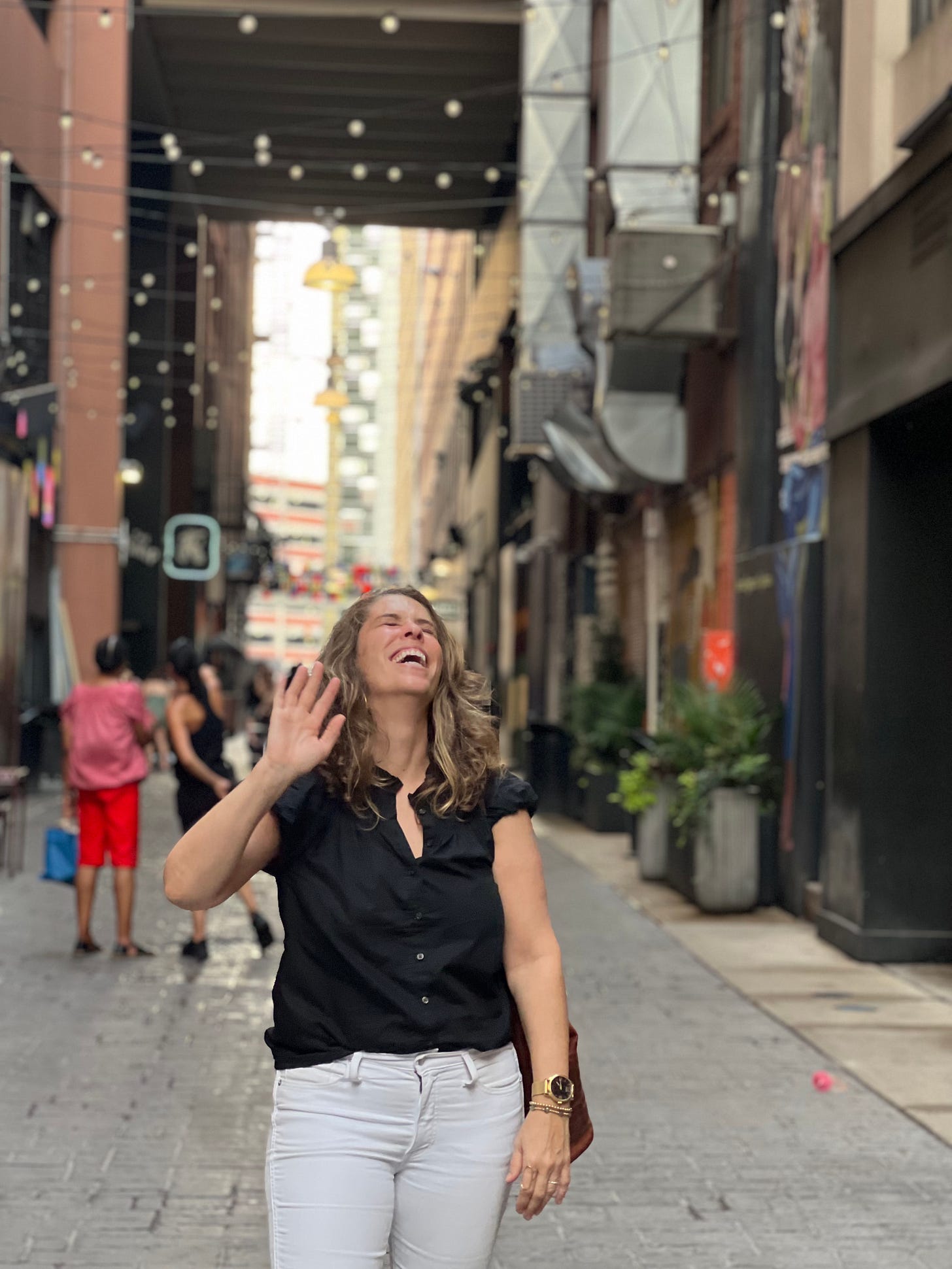Self-Acceptance Leads to Change: Therapy Notes (Pt. 3)
Small Bits of Wisdom From Inside the Room
Hello ♡,
I just returned from an absolute joy-filled trip to visit a dear friend. I loved every minute of this trip, I really wanted to go! But I felt my body start to tense up about traveling. Why? Because I never want to travel. I know this about me. As a highly sensitive introvert, I always struggle to leave the quiet familiar. I have joked that I prefer to be bubble wrapped.
But it’s not just that. As someone who struggled deeply with anxiety for over a decade of my life (which you will read about in my upcoming book) - traveling always produces more of a threat response than a happy response in my body at first. My body remembers feeling even more out of control out of my regular habitat. This doesn’t ever stop me now, but the memory of not wanting to leave my comfort zone always says hello. I just take that part with me until it settles, which it quickly does. It would be easy to criticize myself for this. And I certainly shouldn’t be writing about this as a practicing therapist, right? We’re supposed to be shiny and perfectly put together.
And so what do I do?
I accept myself. Swiftly and fully.
I gently tap my watch, as I have taught many of my clients to do, and I say, “right on time.” The dread of travel? Right on time. The dread of leaving my cozy introvert nest? Right on time. The familiar fight or flight feeling of doing anything out of my comfort zone? Right on time. Hello, again.
And then what happens is not magic, it is therapeutic. And a huge relief.
I breathe. I accept myself. I say, “Hey, that’s ok. You’re ok.” I remind my sweet self of what I know: I am always happier when I do things I want to do, and spend time with the people that I want to. I am no longer that young anxious girl who didn’t have any answers for an untreated anxiety disorder. I accept all the things about myself that are not shiny or Pinterest worthy. I love on them, I joke about them! And then? I go on the trip. And oh what a lovely, soul filling, friendship celebrating trip it was!
We are taught to change we must reject ourselves. We must white knuckle change. We must beat ourselves up until we approve of our new improved shape. But nothing could be further from the truth.
I should say that my temperament and anxiety memories are not acute struggles now. They are more like quirks. But that was not always the case with my anxiety. There was a time when it was so acute I struggled to make it through a day. Self-acceptance was a foundational tool then, and is a foundational tool now. From the acute to the quirky, a loving embrace of all of our parts is the way through.
I sit with a lot of internal struggle in my office. Deep depression. Social anxiety, mind going terrifyingly blank in new conversations. Triggered moments, inconveniently causing it hard to catch your breath. Inner critics ragefully tearing down every fiber of your being. Self doubt creeping like a shadow over any decision. Being a human is hard. And being one that is suffering emotionally and mentally is even harder. What I need in those moments is acceptance not rebuke.
But won’t acceptance lead to resignation? I can hear the same questions I hear in my office popping up.
No. In fact, the opposite. Acceptance clears the way to get to yourself in the struggle and to help yourself through the struggle.
It is often the lack of self-acceptance that I am wading through with clients before we even get close enough to touch the struggle. “I shouldn’t feel this way,” “I am overreacting,” “This is embarrassing,” “No one else deals with this,” “This isn’t normal,” or “What is wrong with me?” are common feelings we are wading through. Like mud slowing our movements, we try to reach the heart of the struggle that needs our compassion and help that led to the self-rejection.
What can this look like? Using the imagined, but common examples above, it could look like this:
I will not beat myself up for struggling with depression, because this fills me with shame and a lethargy that is hard to stand up under. I will instead accept I am struggling with this, affirm I am still loveable, and in that acceptance find some energy to get the help I need.
I will not belittle myself for my social anxiety. That only makes me more anxious. I will accept that everyone struggles with something, and this is mine for now. In that self-acceptance I can have a “good night” or a “hard night” and remember I am still ok.
I will accept myself when I get triggered. This is not a failure on my part, it is my body trying to protect me. In the space I free up with this acceptance, I can soothe myself back to a place of calm and felt safety more easily.
I will not hate myself for how I hate myself sometimes. I will love even the inner critic part of me, knowing that she is trying to protect me from harm by beating everyone to the punch, or keeping me in line. I will forgive and love on her until she feels safe enough to let me live without her rebukes.
I will not be ashamed of my self doubt. I will accept that sometimes I am unsure, and sometimes I don’t give myself enough credit. And other times I am afraid of being wrong again, because it wasn’t safe to be imperfect growing up. By doing that I am actively reparenting myself in a different way than I was raised.
And so I leave you with this: You may have been taught that the way to change yourself is to be hard on yourself. But from inside the therapy room, and in my life, I can tell you that accepting yourself is not only the gateway to change, it is a super power too. When you accept what you’ve believed you should reject, you are already ushering healing in. You make space for understanding, insight, comfort, relief, tangible help, and even humor, rather than spending your energy rejecting yourself. Self-acceptance flings open the doors and says, “Yes, even here I can be loved, and even here I am ok.”
With you,
Monica
We are currently in a Series called Therapy Notes: Small Bits of Wisdom From Inside the Room:
This series will offer insights I wish I could pass out for free (here goes), things that help me in my life, and certainly things I wish I’d known before I became a therapist.
Therapy is both an art form and a collection of knowledge. Much of this knowledge is gleaned from the clinical research that informs the science of the field. However, the kitchen table version, simplified down to accessible takeaways, is where I see the most effective help. I hope this series will offer some wisdom from the practice of therapy. My own definition of wisdom is: knowledge you can actually use.






a timely read, coming out of a well-worth it, but also known anxiety-inducing event.
anticipating and greeting the anxious thoughts was really helpful this time around, instead of resisting at full force with a "not againnn" mentality.
Appreciate these thoughts and how you show up
So many useful lessons here. It is very helpful! Thank you